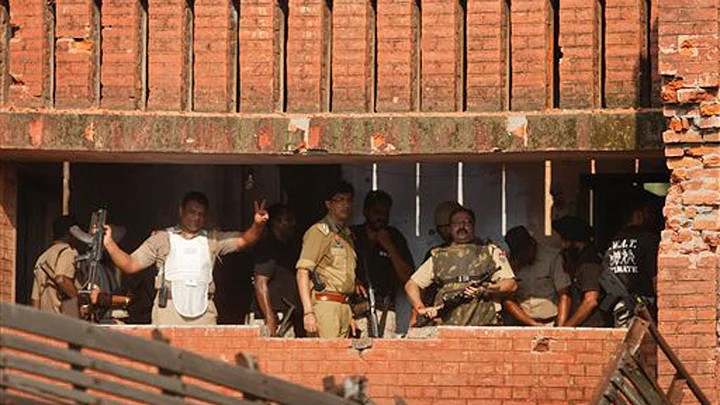Glaring Security Loopholes
Gurdaspur terror attack third such attempt to penetrate Punjab since November 2014
Brazen attempt by terrorists to target Gurdaspur, a thickly populated town, also not far from the holy city of Amritsar
Security lapse on part of the BSF that patrols the border, need to introspect how were terrorists able to surpass multi-layered security checks
Drug-smuggling racket explains the porosity of the border which acted as an easy gateway for terrorists
Monday’s terror strike in Gurdaspur, Punjab, has clearly shown Pakistan’s inclination to widen the theatre of action in the western sector, especially along the state’s 2,000-km-long border which, despite being fenced, is porous, enabling militants to sneak in with little risk.
The attack in Gurdaspur is the third major attempt by terrorists to penetrate Punjab. In the previous two strikes, terrorists entered through Arnia in November 2014 and Kathua in March this year. As in Gurdaspur, the terrorists who attacked Arnia and Kathua were dressed in Indian army battle fatigues, targeted civilians and security installations after sneaking across the border manned by the Border Security Force.
The worrying aspect of the Gurdaspur attack is that had the terrorists managed to penetrate inwards towards the district headquarters, they could have unleashed a bloodbath because Gurdaspur town is thickly populated. Worse, they could have proceeded towards the holy city of Amritsar.
.jpeg?auto=format%2Ccompress&fmt=webp&width=720)
BSF’s Inability
A preliminary analysis of the attack showed that after crossing the border somewhere near Dinanagar early on Monday morning, the terrorists first hit a roadside dhaba, hijacked a Maruti 800 car before shooting dead a vendor on bypass road and driving into the town where they opened fire at a bus and a community health centre adjacent to the police station.
The attack exposed the inability of the BSF to fully guard the frontier, although their task had been made relatively easy by the fencing which is an elaborate system of high pillars reinforced by concertina wires from top to bottom.
Long stretches of the formidable fencing is illuminated at night and several watch towers along it help provide constant watch. Besides, the fencing runs between 50 and 100 metres behind the no-man’s land. The strip of land between the fencing and the no-man’s land has artificial mounds of earth that nestles BSF bunkers.
BSF troops patrol the entire stretch of the fencing on foot and vehicles. Given the layers of security and obstacles, it is difficult to comprehend as to how the terrorists could get across without being challenged.
.jpeg?auto=format%2Ccompress&fmt=webp&width=720)
Drug Peddling Menace
Last year, when the BJP mounted pressure on its Akali allies in Punjab and raised the issue of drug peddling, in which a few Punjab politicians are allegedly involved, the Shiromani Akali Dal (Badal) hit back, accusing the BSF of failing to prevent the cross-border smuggling of narcotics.
In August 2014, the Tarn Taran police had detected a nexus of BSF personnel and international drug smugglers. Those arrested included two BSF jawans. Investigations revealed that the gang worked closely with Pakistani smugglers and had links with Paramjit Singh Panjwar, a self-styled chief of the Khalistan Commando Force and one of the 20 most-wanted persons figuring on the list shared by India with Pakistan.
Officials’ Involvement
Two years ago, the then Punjab DGP (Prisons) Shashi Kant stirred a hornet’s nest, claiming that “drugs are being smuggled in from the Indo-Pak border as several policemen, Customs officials, politicians, members of civil society and BSF officers are involved in smuggling narcotics.”
My inquiries along the border revealed that farmers and locals from both sides are involved with the trans-border network that runs the drug smuggling racket. Some BSF personnel had admitted that while small packets would be thrown across the fence, the smugglers also made use of natural features like streams to slip the contraband across. Small tunnels used by the smugglers were also detected. They disclosed that smuggling would spike during the winter months when couriers would take the cover of thick fog.
.jpeg?auto=format%2Ccompress&fmt=webp&width=720)
Sign of Weakness
But the issue of armed militants managing to slip across the fortified border is of a different league. With the Islamic State (IS) raising its head in Pakistan and various militant groups such as Hizb-ul-Mujahideen and Lashkar-e-Taiba making frequent attempts to target India, the absence of a strong response at the border itself is a clear sign of weakness.
What is inexplicable is that it took Home Minister Rajnath Singh’s directions to the BSF director-general to “step up vigil on the border” to beef up security. Punjab Chief Minister Parkash Singh Badal was quick to describe the Gurdaspur attack a “national problem.” Clearly, the army’s heightened vigil in northern Kashmir has forced terrorists to infiltrate in the south.
A recent assessment by General Officer Commanding in Chief (GoC-In-C), Northern Command, Lt Gen D S Hooda indicated that infiltration in Kashmir has gone down appreciably. There was also a downward trend in the number of terrorists liquidated. But Lt Gen Hooda had cautioned that southern Kashmir remained a concern.
The Gurdaspur incident shows that the terrorists are prepared to look for softer entry points.
(The writer is a freelance journalist)
(At The Quint, we question everything. Play an active role in shaping our journalism by becoming a member today.)
